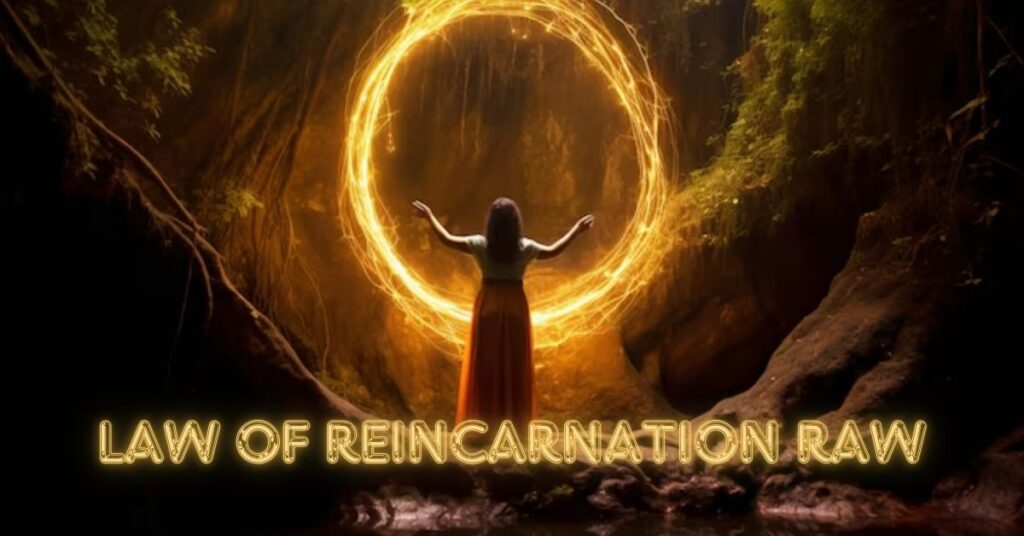introduction
Have you ever wondered what happens after we take our last breath? The concept of reincarnation offers a tantalizing glimpse into the possibility of life beyond death. It sparks curiosity and raises profound questions about existence, purpose, and the nature of our souls. In this exploration of the law of reincarnation raw, we’ll delve deep into its fascinating dimensions—unpacking cultural beliefs, scientific studies, personal stories, and even the enigmatic role that karma plays in this cycle of rebirth. Whether you’re a skeptic or a believer, prepare to embark on an eye-opening journey that could transform your understanding of life itself.
Understanding the Concept of Reincarnation
Reincarnation is the idea that our souls are reborn into new bodies after death. This cycle continues until we reach a state of enlightenment or liberation. It’s a concept rooted in many spiritual traditions, particularly within Hinduism and Buddhism.
At its core, reincarnation emphasizes growth and learning. Each lifetime presents opportunities to evolve spiritually. Our experiences shape who we become in future lives, adding layers to our existence.
This belief challenges the notion of a single life cycle. Instead of viewing death as an end, it opens up possibilities for transformation and renewal.
The journey through various incarnations suggests that every action carries weight—both good and bad—impacting not only this life but those yet to come. As such, reincarnation invites us to reflect on our choices and their ripple effects throughout time.
Cultural Beliefs on Reincarnation
Reincarnation is woven into the fabric of many cultures worldwide. In Hinduism, it’s a journey through various lives influenced by karma. Each incarnation offers lessons meant to elevate the soul.
Buddhism also embraces this concept, viewing it as a cycle of samsara. Liberation from this cycle, known as Nirvana, is the ultimate goal for practitioners.
In contrast, some Indigenous cultures perceive reincarnation more fluidly. They believe their ancestors return in different forms—animals or elements—maintaining a sacred connection with nature.
Western perspectives on reincarnation have gained traction too. Popular spiritual movements often blend ancient wisdom with new-age philosophies.
These diverse beliefs shape how societies understand life and death. They influence rituals and practices surrounding grieving and honoring those who have passed on, creating rich traditions that celebrate continuity beyond physical existence.
Scientific Studies and Evidence Supporting Reincarnation
Scientific exploration of reincarnation has gained traction over the years. Researchers have delved into cases that defy conventional explanations, seeking to unravel this complex mystery.
One notable figure is Dr. Ian Stevenson, a psychiatrist who documented over 2,500 cases of children claiming past-life memories. His meticulous case studies provide intriguing evidence, as many children exhibited knowledge about people and places they had never encountered in their current lives.
Additionally, some scientists have examined near-death experiences (NDEs) for clues regarding life after death. Patterns emerge from these accounts: individuals often report feelings of peace and encounters with deceased loved ones.
While skepticism remains prevalent in academic circles, growing interest continues to inspire further research. These attempts shed light on a phenomenon that challenges our understanding of consciousness and existence beyond our physical reality.
Personal Stories and Experiences of Reincarnation
Many people have shared their personal experiences with reincarnation that challenge the boundaries of our understanding. These stories often reveal vivid memories from past lives, complete with names and places.
For instance, a young girl in India claimed to remember her life as a woman named “Rama” who lived in a nearby village. Remarkably, she identified family members and detailed events that only someone from that life could know.
Similarly, adults recount dreams or flashes of incidents they believe are remnants of previous existences. One man vividly described being a soldier during World War II, recalling specific battles and even the feeling of loss he experienced.
Such accounts spark curiosity about identity and existence itself. They provoke questions about how these glimpses into former lives shape our current realities. Each story adds another layer to the intricate tapestry woven by the law of reincarnation raw.
The Role of Karma in Reincarnation
Karma plays a pivotal role in the law of reincarnation raw, acting as the guiding force behind our soul’s journey. Every thought, action, and intention creates ripples that affect future lives.
This intricate balancing system ensures that we reap what we sow. Positive actions can lead to beneficial circumstances in subsequent existences, while negative deeds may result in challenges or hardships.
Understanding karma allows individuals to reflect on their current life choices. It serves as a reminder that today’s behavior shapes tomorrow’s reality.
Many believe this connection fosters personal growth and spiritual evolution over multiple lifetimes. The lessons learned from past experiences become stepping stones for advancement.
Thus, karma isn’t just about punishment or reward; it’s a tool for enlightenment. It encourages responsibility for one’s actions and inspires a deeper understanding of life’s interconnectedness.
How to Prepare for the Next Life in the Law of Reincarnation
Preparing for the next life under the law of reincarnation involves cultivating a mindset focused on growth and learning. Embrace experiences that challenge you. This helps develop resilience, which can be vital in future lives.
Fostering compassion is another essential step. Acts of kindness elevate your spirit and create positive karma, influencing your soul’s trajectory. Each small gesture contributes to a larger tapestry of existence.
Meditation and mindfulness are powerful tools as well. They expand your awareness beyond the physical realm, allowing deeper connections with past experiences or future possibilities.
Seek knowledge through spiritual teachings. Whether through ancient texts or modern philosophies, understanding different perspectives enriches your journey and prepares you for what lies ahead in potential new existences.
Controversies and Criticisms Surrounding Reincarnation
The law of reincarnation raw often stirs heated debates. Critics argue that the concept lacks empirical evidence and relies heavily on anecdotal accounts. Skeptics question the validity of memories claimed by those who believe they’ve lived past lives.
Some researchers point to psychological explanations for these experiences, suggesting they stem from subconscious thoughts rather than actual previous existences. The possibility of false memories can make it challenging to distinguish truth from imagination.
Moreover, varying religious interpretations complicate discussions around reincarnation. Different cultures have unique beliefs about the afterlife and rebirth, leading to conflicting views on what happens when we die.
Additionally, mainstream science tends to shy away from topics like this due to their unverifiable nature. This reluctance fosters a divide between spiritual perspectives and scientific inquiry in understanding life beyond death.
Conclusion: Embracing a New Perspective on Life and Death
The law of reincarnation raw invites us to explore the profound mysteries surrounding life and death. It encourages a shift in perspective, urging us to view existence as a continuous journey rather than a finite experience. This belief system offers insights into our purpose and the interconnectedness of all beings.
Understanding reincarnation can foster compassion toward others, knowing they too may be navigating their own cycles of growth. Each life presents an opportunity for learning, healing, and evolution. Embracing this idea might inspire individuals to live more mindfully and authentically.
By acknowledging the role karma plays in shaping our experiences across lifetimes, we begin to see how our actions today impact not only our present but also future incarnations. The stories shared by those who have experienced past lives serve as poignant reminders that we are part of something greater than ourselves.
As discussions around reincarnation continue to evolve amidst scientific scrutiny and cultural beliefs, it becomes essential for each person to reflect on what these concepts mean personally. Whether you resonate with established doctrines or lean towards personal spirituality, the exploration itself is valuable.
Embracing such perspectives allows for deeper connections with ourselves and others while encouraging an open-minded approach toward life’s many wonders—including what lies beyond death’s threshold.
FAQs
1. What is “Law of Reincarnation Raw”?
“Law of Reincarnation Raw” refers to a comprehensive exploration of reincarnation, focusing on various dimensions including cultural beliefs, scientific studies, and personal experiences related to life after death. It examines how the concept of reincarnation—where souls are reborn into new lives—intersects with ideas like karma and personal growth, offering a deep dive into the spiritual and philosophical implications of rebirth.
2. How does reincarnation influence personal growth across different lifetimes?
Reincarnation suggests that each lifetime provides opportunities for spiritual and personal development. As souls experience different lives, they encounter various lessons and challenges that contribute to their growth. The experiences and choices made in one life are believed to affect future lives, creating a continuous path of learning and evolution.
3. Are there scientific studies that support the concept of reincarnation?
Yes, some scientific studies have explored reincarnation. Notably, Dr. Ian Stevenson documented numerous cases where children claimed to remember past lives. Additionally, near-death experiences (NDEs) have been studied for patterns that might indicate an existence beyond physical life. While these studies offer intriguing evidence, the concept remains debated within the scientific community.
4. How do different cultures perceive reincarnation?
Different cultures have varied beliefs about reincarnation. In Hinduism and Buddhism, reincarnation is seen as a cycle of rebirth influenced by karma, with the ultimate goal being spiritual liberation. Indigenous cultures often view reincarnation as a return in different forms, such as animals or elements. Western spiritual movements have also adopted and adapted these ancient beliefs, integrating them with contemporary philosophies.
5. What role does karma play in reincarnation?
Karma is a crucial element in reincarnation, acting as the mechanism by which actions in one life influence future existences. Positive actions are believed to lead to favorable circumstances in subsequent lives, while negative actions may result in challenges. Karma serves as a guiding principle, encouraging individuals to live ethically and mindfully, knowing their choices affect their spiritual journey across lifetimes.







